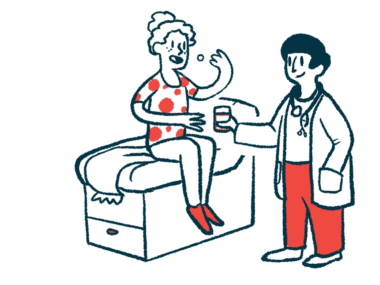The things we learn while living with myasthenia gravis
Some helpful advice for the difficult days that come with MG
Written by |

So you have myasthenia gravis (MG). Some of your friends or family have distanced themselves from you. You take handfuls of pills every day to kinda-sorta function. Life isn’t what it used to be.
Get over it.
Yup, you heard me. Get over it. But hear me out. You can thank National Get Over It Day on March 9 for the topic of today’s column.
Living with myasthenia gravis is hard
We become the flaky friend. Thanks to the fluctuation of symptoms in even moderately controlled MG, I have found that I rarely give a hard yes or no to event invitations. It used to bother me significantly when those invitations stopped coming.
But the more I focused on what was best for me and the life I wanted to live, the easier it became to understand where others were coming from. Some people need a hard commitment for a variety of reasons. If I expect acceptance and understanding for my needs, then I must also extend the same courtesy to them.
Treatment can be overwhelming
Some myasthenics are “lucky” when a single treatment option works well for them and allows them to live a relatively normal life. That treatment could vary from person to person. Others have managed MG moderately well with a combination of treatments. I consider myself in this category. Some are barely functioning on their treatment plan but manage to avoid major symptom flares or exacerbations. Still others seem to be in and out of the hospital with refractory MG, when the disease can’t be controlled by currently available medications.
I personally take a fistful of meds every day to keep symptoms at bay. My treatment plan consists of intravenous immunoglobulin infusions every three weeks, Mestinon (pyridostigmine bromide) of varying frequency and doses depending on the time of day and manifestation of symptoms, prednisone, and Imuran (azathioprine). I also take duloxetine, an albuterol inhaler, a Wixela inhaler, fluticasone nasal spray, and some vitamins.
But you know what those meds do for me? They keep me out of the hospital. I’m slowly losing weight as I have been tapering down the prednisone dosage. They allow me to go to brunch with my husband every Thursday and not choke on my food. They allow me to live and try to thrive, not just survive.
I miss my old life
Life definitely isn’t what it used to be. I loved my job as a medic in the U.S. Army. I loved being the go-to person for things and prided myself on my reliability. But because of myasthenia gravis, I have been given this rare opportunity to help others by telling the story of my journey.
I get to share snarky and sassy columns like this one that might help reframe a negative mindset into one that allows someone to go forward with a little more pep in their proverbial step. (Just please don’t trip on my account.)
Yes, all of these things make life with myasthenia gravis hard. There’s no doubt about it. So you focus on what you can control, dismiss the things you can’t, and you get over it.
You move on doing the things you can do. You focus on the positives, like meeting all of the amazing people who understand where you’re coming from instead of trying to explain it to someone who has no clue. You distance yourself from the negative Nancys. And you get over it.
We all know that with MG, we don’t even have control of our bodies on some days. But, generally speaking, most of us still have control of our mind, even on the brain fog days. So you accept that you have no control over how others respond to any given situation. The only thing you have control over is how you respond and react. And if someone responds in a way that is not what you were hoping for, you acknowledge your disappointment but then you get over it.
Dwelling and focusing on the negative does nothing but stress us out. Stress is bad. “Get over it” doesn’t have to have the negative connotation you probably assigned to it when you initially read it. It can be the subtle reminder that there are more important things that deserve your energy.
Note: Myasthenia Gravis News is strictly a news and information website about the disease. It does not provide medical advice, diagnosis, or treatment. This content is not intended to be a substitute for professional medical advice, diagnosis, or treatment. Always seek the advice of your physician or other qualified health provider with any questions you may have regarding a medical condition. Never disregard professional medical advice or delay in seeking it because of something you have read on this website. The opinions expressed in this column are not those of Myasthenia Gravis News or its parent company, Bionews, and are intended to spark discussion about issues pertaining to myasthenia gravis.




Tom Bartlett
Wonderful representation of our lives! Thank you for sharing! Not many people know, nor can hear our inner voice, when we need to just get over it. It’s a conversation to keep us moving forward because we don’t have any choice. Forward is the only direction we can move whether we want to or not. Thank you for expressing what we all feel!
Shawna Barnes
Thanks Tom! I'm glad this resonated with you. I am definitely not afraid to share that inner voice... ha - Shawna
Joy glanz
It’s been a daily battle. But worst of all I can’t find a mg doctor to treat me.
Jerry Anderson
You have to go to a Neurologist took me 4 months for me to get to see him. By then i was almost in a crisis state. Hop this helps you. I finally had to go on life support with ventilator for 2 weeks while the did a plasma transfer 2hrs a day for week. thank heaves i am hjome now but and can walk and breath, but have a hard road a head I am 85. Take to God that's the only way i am still alive. Jerry Anderson
Shawna Barnes
It is a daily battle, Joy. I'm sorry to hear you've been unable to find a doc to treat you. Please keep advocating for yourself with your care team. - Shawna